
Born to Breed: The Estridsen Lectures
- Thread starter Peter Ebbesen
- Start date
-
We have updated our Community Code of Conduct. Please read through the new rules for the forum that are an integral part of Paradox Interactive’s User Agreement.
You are using an out of date browser. It may not display this or other websites correctly.
You should upgrade or use an alternative browser.
You should upgrade or use an alternative browser.
Oh, I've heard of "Bloody Harry"! Wasn't that the guy the drink was named after? No?
Well, at least I recognized the play. Oscar Wilde is my favorite.
Anyway, I'm looking forward to learning more about the kings of... Sweden... I mean Norway... wait, I did write it down in my notes...
Well, at least I recognized the play. Oscar Wilde is my favorite.
Anyway, I'm looking forward to learning more about the kings of... Sweden... I mean Norway... wait, I did write it down in my notes...
Here you can have a peak at mine. Best part, when the king's son was sent to the nunnery! Man, I'd wish MY old man was like that! Also, where were you last night? We had a blast! Sigrid and Beate went wild with...oh. Hello professor.  o
o
wonder how bloody bloody harry will be...excited t see how he ends up dealin with his heavenly multitude of brothers 
Quift - For singleplayer, I consider CK2 to be the best Paradox strategy game developed yet. It isn't the greatest strategic challenge, but there are so many things that are done just right. Given my sense of humour, make of that what you may.
Now you’ve done it. I’ve been hesitating on buying the game but with such praise I’m going to have to give it a try. At least I know who to blame if I don’t like it…
Thanks everybody... I think.  With luck the next installment should be up soon(tm). I do note that there's an unfortunate and thoroughly unjustified focus on the "Bloody Harry" part. It is just an affectionate nickname by later sensationalist historians. As was clearly indicated by its primacy in the last chapter, the king is more properly known as king "Harald the Serene", and I promise you that the next chapter will thoroughly demonstrate why this is the case.
With luck the next installment should be up soon(tm). I do note that there's an unfortunate and thoroughly unjustified focus on the "Bloody Harry" part. It is just an affectionate nickname by later sensationalist historians. As was clearly indicated by its primacy in the last chapter, the king is more properly known as king "Harald the Serene", and I promise you that the next chapter will thoroughly demonstrate why this is the case.
-- Storey: Buy it, play it, write an AAR. It is exceptionally well suited for just about any AAR style excepting only possibly some of the more degenerate military porn varieties from the Hearts of Iron writing gang.
-- Storey: Buy it, play it, write an AAR. It is exceptionally well suited for just about any AAR style excepting only possibly some of the more degenerate military porn varieties from the Hearts of Iron writing gang.
Hallelujah! First, I get to see Pulp live on tour in New York and then I return to the boards to find a living Peter Ebbesen AAR going?!? And a verified sighting of the reclusive Joe Storey!? If I'm dead, I've gone to heaven, and if I'm dreaming, I never want to wake up! 
<Ahem>
Anyway, off to a spiffing start, good sir. I particularly enjoyed the words of the Immortal Bard:

<Ahem>
Anyway, off to a spiffing start, good sir. I particularly enjoyed the words of the Immortal Bard:
I actually laughed out loud. At work, no less. Good thing it's my lunch break.In the bard's immortal words from Svend II act III ,
Svend II: “You are a brave warrior, my son, and I've got to admire your lust for life, but you are an ambitious knave and hate my guts. Get thee to a nunnery!”
Knud: “You are too gracious, sire. This is such stuff as dreams are made on. I woulds't be a breeder of sinners!”
Svend II: “My clerk kindly informs me that I used the wrong gender, there... Monastery, that's the word. Latin is such a tricky tongue.”
Knud: “Something is rotten in the state of Denmark.”
Born to Breed: The Estridsen Lectures
Harald III Estridsen the Serene
regarding drinking, the pursuit of self-destruction, a growing class, on the virtue of caring and sleeping patterns, seemingly attentive students, Gnupa the impaler, the professor isn't fooled, the king and the cousin, serenity and anticipation, war and peace, marital dilemmas, dramatic licence, family problems, a lack of issue, issue at last, tragedy, blackest grief, spiritual betrayal, rekindling of life, interesting times ahead.
Harald III Estridsen the Serene
regarding drinking, the pursuit of self-destruction, a growing class, on the virtue of caring and sleeping patterns, seemingly attentive students, Gnupa the impaler, the professor isn't fooled, the king and the cousin, serenity and anticipation, war and peace, marital dilemmas, dramatic licence, family problems, a lack of issue, issue at last, tragedy, blackest grief, spiritual betrayal, rekindling of life, interesting times ahead.
Welcome back, class. It is indeed a joy to see so many young students fresh from binge-drinking and the relentless pursuit of physical self-destruction take the time off from their well deserved rest to sleep in my class. Indeed, the class appears to be growing – or perhaps gentlemen like young Lenny here just didn't feel like showing his mug in class before. Who knows, and more importantly, who cares? With nothing expected of you and flunking you for inattention, ignorance, or incompetence being declared “obsolete”, you have every right in the world to attend only such lectures as fits your sleeping patterns. Though it must be admitted that some of you seem scarily attentive; Beate and Sigrid, you really don't need to sit fidgeting at attention as if Gnupa the Impaler rammed a pole up your arse. Your bleary eyes betray you and I saw how you staggered as you sought your seats, so feel free to sleep off whatever high you are on and cease that incessant giggling!
Now, as for those of you still awake, I enjoin you to listen to the tale of Harald III Estridsen as he took the throne of Denmark that May-day of 1070. At 29 years of age, he was tall and lofty of mien, a content man, as kind as he was just, and he was married to the love of his life, Margrethe, who was his cousin by his uncle Asbjørn. They had a little daughter and could look forwards to many more children, for Margrethe was still young. Of all his brothers, none were as serene as he, and many in the kingdom anticipated that his would be a reign of peace and prosperity.
They were to be proven half-right.
Europe in 1071
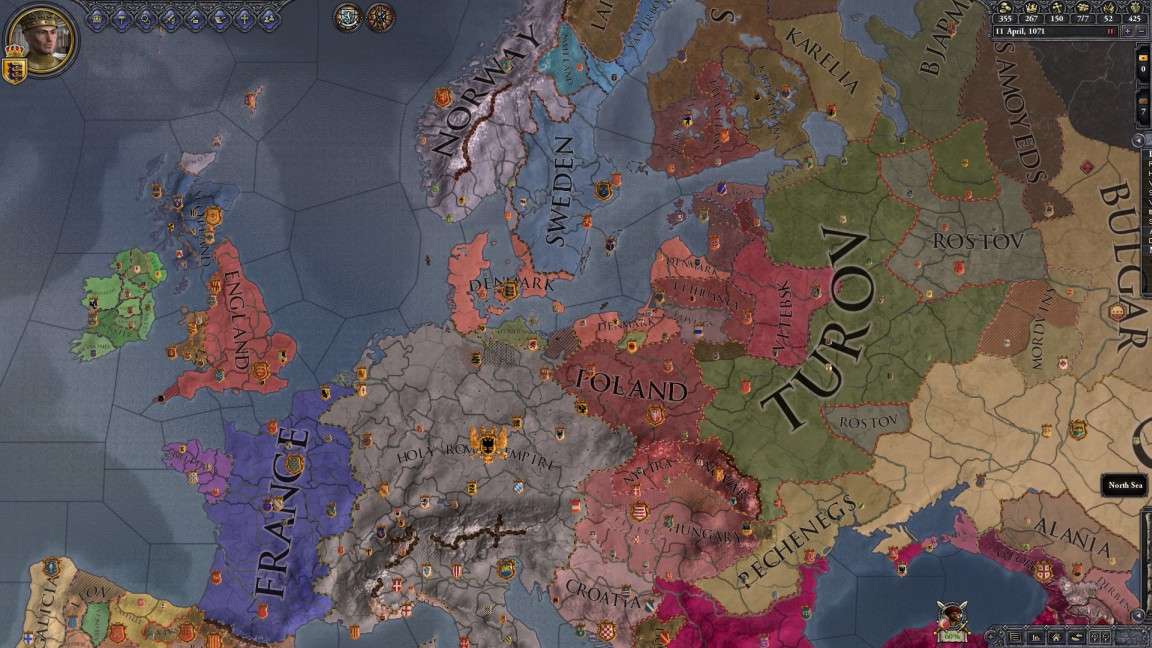
Harald the Serene and Margrethe

Harald the Serene and Margrethe
During the first years of his reign, Harald finished his father's holy wars in Courland and launched a small war of his own against Chelmno to ensure Danish control of the entire duchy of Pomeralia. Having thus established his warlike abilities for all his vassals to see, he devoted himself to what was to become his main tasks during his third decade of life: a massive construction project in Sjælland and restraining his wife's homicidal tendencies.
Yes, it is a fact of life that one's dearly beloved does not always share one's own approach to life. This can add a certain amount of spice to married life, and in the best of cases keep one on one's toes and the flames of ardour burning the brighter for the occasional conflict, but in other cases it can provide sincere moral dilemmas.
Such as, to take an example not completely at random, if you are a just king and your wife spends every moment not devoted to her conjugal duties, on which she prefers spending as little as possible due to her chastity and piety, on plotting how to kill those who have slighted her in the past, those who have crossed her path, and those who look as if their shadow might possibly come somewhere near crossing her path in the future... With a particular eye to keeping it in the family, as it were.
You gaze into those baby-blue eyes and tell her to end her plot to kill one of your nephews or nieces or officials or vassals or friends or colleagues, her eyes mist, and she tearfully asks if you can find forgiveness in you... You look into your heart and feel your love as strong as ever and take her in your arms to comfort her even as you discipline her, in response to which she unselfconsciously wriggles in ways that makes yours blood boil, and in act of supreme generosity on her part that goes against her very nature, as well you know, for her chastity is proverbial, unsheathes the royal sword and, seizing the crown jewels, begs you to... while her.... Harumph! What I meant to say is that these things can be complicated and even the best of men can have trouble reconciling difficult priorities, and that's the rule even with ordinary homicidal wives such as any man can be afflicted with, that don't address their husbands as “Dear Cousin” even in the most intimate moments.
Kindly stop drooling, Murmurandus!
Dearest Cousin of Mine...
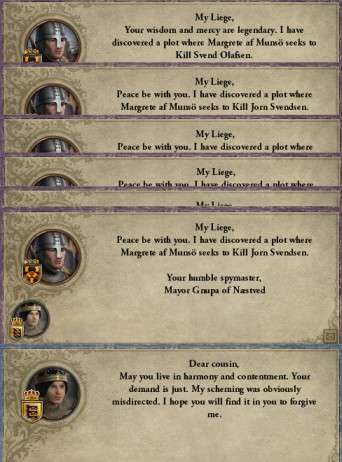

As said, these are just some of the troubles you must live with, when your wife is an ambitious, chaste, greedy, and lazy woman, who channels all her latent frustrations, anger, and excess energy, into intrigue.
It must almost have come as a relief in mid-1072 when his spymaster reported that for once he had discovered a plot initiated by somebody other than the queen. This time it was his brother Benedict's wife, princess Jimena, who had been caught plotting murder, though the fact that it was Harald's own murder that was sought to advance Benedict to the throne must have limited the relief.
Please Discipline Jimena, Brother Benedict
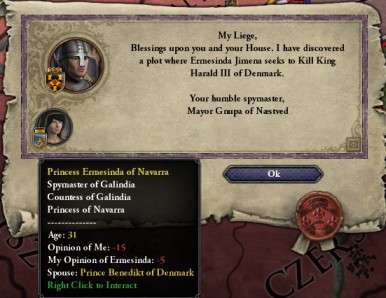

Yes, Harald was indeed deeply, passionately in love with his wife and despite being driven ragged with worry, stress, and even pneumonia (1073 was an especially tough year, but 1075 wasn't much better!), he never lost an opportunity to show it.
A Much Beloved Queen
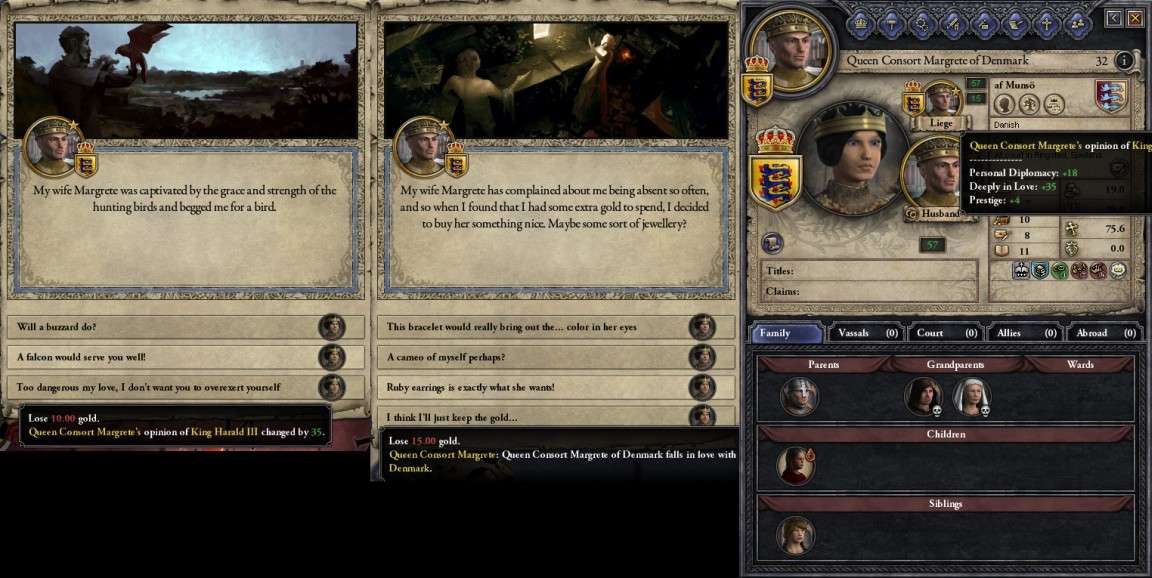

He only drew the line at affairs of state; those were his, and only his, to dispose of as he saw fit.
No Love, Your Cat's Paw Won't Become Marshal


The only worry was the lack of an heir. As the years passed and their daughter remained the sole issue of the union, people began to talk. Now, it wasn't critical for the kingdom that Harald have have a son, for his brother Erik was next in line to the throne and a worthy heir, but an heir of the king's own body was always preferable. Nobody suggested in public that he should put her aside in favour of somebody more fertile but under the circumstances, that wouldn't really have been wise.
It came as a considerable relief to everybody save possible prince Erik the heir, when the queen was announced to be pregnant after Christmas 1075-76, and in September 1076, nine months and a week to the day after Christmas eve, she delivered their second child, Harald's son Bjørn.
...It almost goes without saying that this didn't stop her plotting.
1076: A Son at Last!
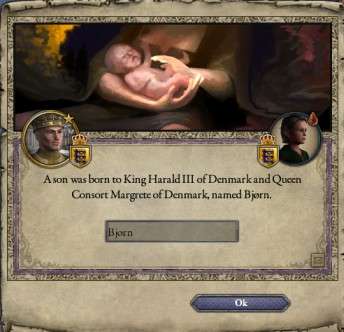

Alas, giving birth to her son took something vital out of her, and she swiftly declined over the next years, dying in March, 1079, with only a handful of discovered new murderous plots to her name.
That Terrible Day, spring 1079

King Harald's Grief

King Harald's Grief
Harald grieved, and if he had been left to grieve, much that is now infamous would not have come to pass, but his grief was disturbed. His brothers, the clergy, and vassals nagged that he should remarry, but in the face of such provocation he remained steadfast in his devotion to his dead wife, relying always on the spiritual guidance of his faithful Lord Spiritual, Bishop Frederik of Ribe, whom he had recalled from the mission to Galindia.
All Harald really needed was a few months to recover from this terrible loss on top of all the other losses of the last few years. (His brother Olaf and several nephews and nieces had died of natural causes, the Hvide family of Fuenen had died out root and branch reverting Fuenen to the crown, his marshal had died in a stupid duel... Truly, death had stalked the ranks of the nobility.)
But evil never sleeps and while Harald was protected, Bishop Frederik made himself vulnerable in his search for answers, and fell into the blackest of heresy! Catharism! His long fight in Galindia against the heresy, which had entrenched itself amongst the yokels, had failed and he had himself been infected! A tragic loss to the church!
The Fall of the Lord Spiritual, 1079
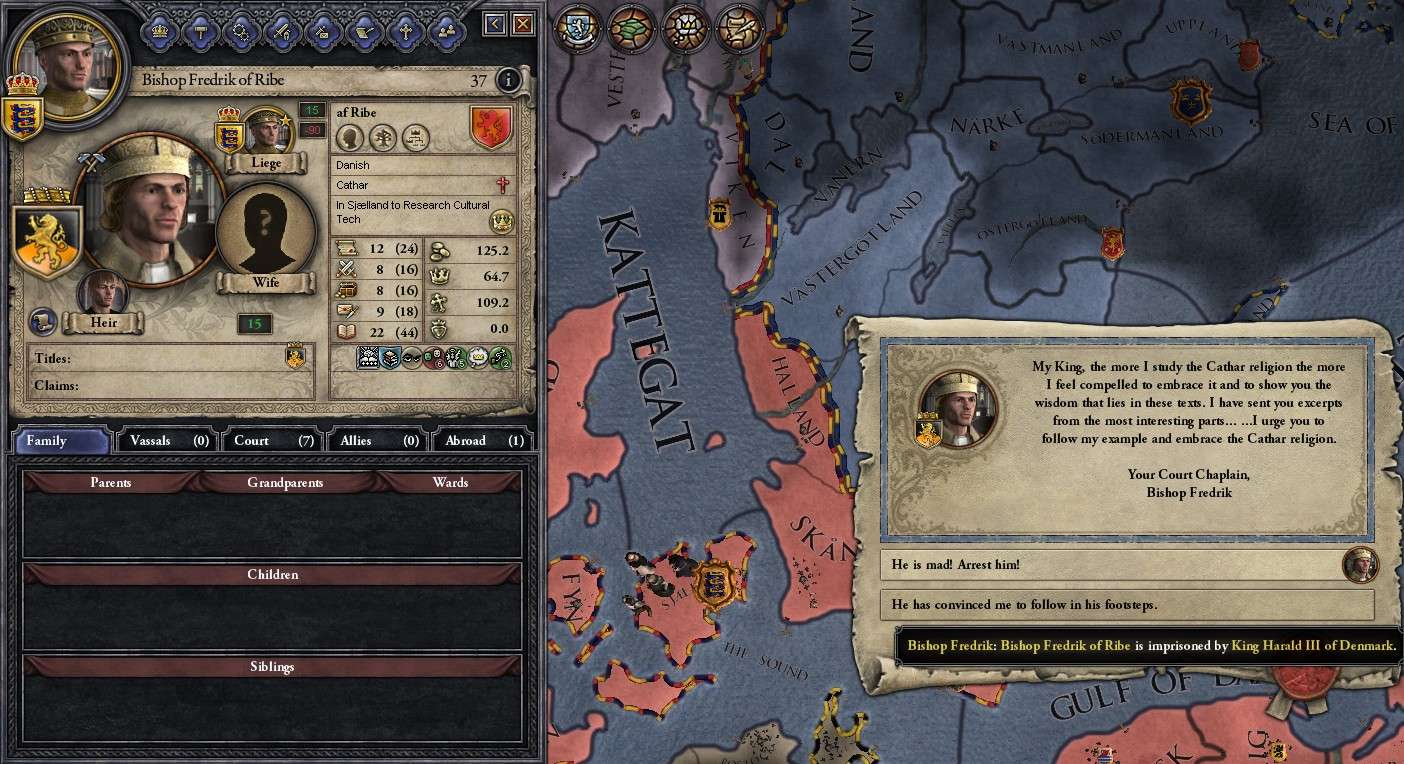

Harald roused himself from his grief, tossed Bishop Frederik in prison to regain his senses, and with nobody but his brothers to restrain him, went searching for a reason to live. He visited friends, relatives, and allies, looking for the one thing that might return joy to his life.
Finally, on his pilgrimage to Rome, he found the answer in Adelise of Brionne, an intelligent and ambitious young courtier from Apulia, who won his heart in a game of darts.
According to the Gesta Danorum, that is. The Anglo-Saxon Chronicle states that after a particularly obscene party in Rome she tripped him up, hogtied him, had her wicked way with him, and forced him to marry her at daggerpoint, but the Anglo-Saxon Chronicle is well known for being both inaccurate and spiteful towards the Danes.
Adelise de Brionne
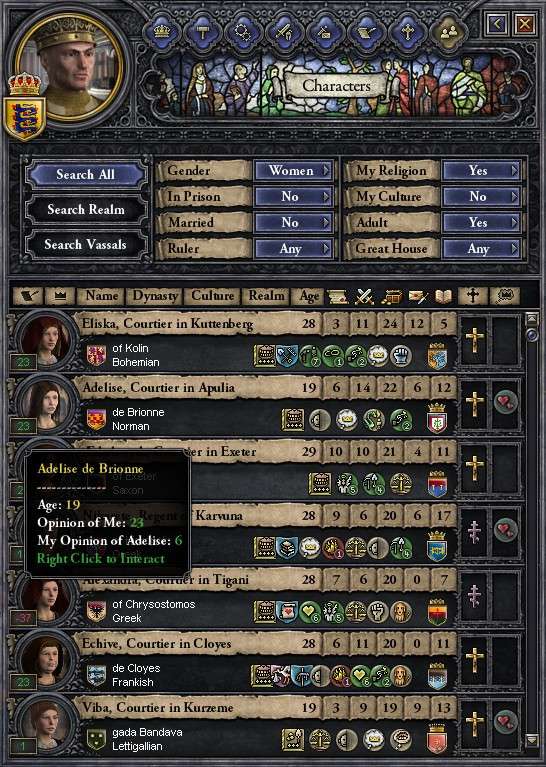

Whatever be the case, the young lady was brave to a fault, prone to pick fights, and didn't have a single devious bone in her well-shaped body, so when the king of Denmark raised her up from obscurity to share his bed and sit at his side as queen-consort, well, she would damn well jolly up her Harald, whatever it took.
Mmm, I see several of you are awake. Perhaps this would be a good place to stop. Harald the Serene, who has spent most of his married life treating one day much like any other, has found new meaning with his life and his life is about to take a change for the wilder and less predictable.
Class dismissed.
Last edited:
- 1
Margrete was an interesting character, a study in contrasts. And the jarring switches from her "Dear cousin"s to her methods of marital reconciliation... Yergh!  hmy:
hmy:
But in the end, she did her duty (albeit not really anything more than the basic minimum) and then conveniently died. No more murderous plots from that lady. Now, as to Adelise, if the Anglo-Saxon version is to be believed, we might be seeing a lot more intriguing from those quarters.
Anyway, the last time the word 'Serene' was used heavily, poor old little Tibet overran the world, so I'm not expecting too much peace and quiet here either.
But in the end, she did her duty (albeit not really anything more than the basic minimum) and then conveniently died. No more murderous plots from that lady. Now, as to Adelise, if the Anglo-Saxon version is to be believed, we might be seeing a lot more intriguing from those quarters.
Anyway, the last time the word 'Serene' was used heavily, poor old little Tibet overran the world, so I'm not expecting too much peace and quiet here either.
So with a devious wife he was content to do little and now with a temperate wife he is prepared to live on the wild side???
Nice work Peter, look forward to more silliness from the Danes.
Nice work Peter, look forward to more silliness from the Danes.
So what if Margarethe was neurotic. All that plotting -no wonder Harald didn't want to get on her bad side. Bjorn means the succession is safe unoess he turns into a combination of Hamlet and Macbeth.
Are we sure that it was Harald getting hog-tied? At least the Romans still throw a good orgy. It's a Cardinal rule! So far harald's reign has been peaceful. He's not what you might call much of a viking now is he? Looking forward to some action.
Are we sure that it was Harald getting hog-tied? At least the Romans still throw a good orgy. It's a Cardinal rule! So far harald's reign has been peaceful. He's not what you might call much of a viking now is he? Looking forward to some action.
"Dear Cousin"... *drools*
Professor, one might hope that this Miss Adelise is as euh... interesting as Queen Maggie...
Professor, one might hope that this Miss Adelise is as euh... interesting as Queen Maggie...
Interesting pillow talk they must have had:
Queen Margrete: But, dear cousin, can't you please let me kill one person? Maybe a random courtier, just for fun? Just the one time?
King Harald: No, dear. (sigh)
Queen Margrete: Pretty please? (puts hand in interesting place...)
King Harald: Oh, drop dead already!
Queen Margrete: As you wish, dear cousin. Urrrghhhh....
King Harald: Jesus, woman, do you always have to take me so damned literally?
Queen Margrete: But, dear cousin, can't you please let me kill one person? Maybe a random courtier, just for fun? Just the one time?
King Harald: No, dear. (sigh)
Queen Margrete: Pretty please? (puts hand in interesting place...)
King Harald: Oh, drop dead already!
Queen Margrete: As you wish, dear cousin. Urrrghhhh....
King Harald: Jesus, woman, do you always have to take me so damned literally?
Born to Breed: The Estridsen Lectures
Harald III Estridsen the Conqueror
memory of chastity, searching for the meaning of life, inappropriate gestures, on ambition, the perils of alliteration, on despondency, quoting Saxo, invasion, battles, a crown, more battles, blood to the ankles, new laws, despicable actions, exporting nephews, putting the boot in, the dangers of inbreeding, the dangers of third-rate battles, another brother bites the dust.
Harald III Estridsen the Conqueror
memory of chastity, searching for the meaning of life, inappropriate gestures, on ambition, the perils of alliteration, on despondency, quoting Saxo, invasion, battles, a crown, more battles, blood to the ankles, new laws, despicable actions, exporting nephews, putting the boot in, the dangers of inbreeding, the dangers of third-rate battles, another brother bites the dust.
Welcome back, class.
As you no doubt recall, following the death of his chaste wife and cousin Margrethe, queen of Denmark, king Harald sought new meaning in life and ended up tying the knot with a bright and bold young Norman, Adelise de Brionne of Apulia, who was brave as a lion, sweet as sin, half king Harald's age, and determined to jolly him up well and good.
That's a very crude gesture, 0Emmanuel, but yes, fornication may very well have been near the top of her mind, for certainly churning out children of her own must have been a high priority, but as it turned out, there was considerably more to her ambition than the pursuit of personal pleasure for purposes of power, if I may allow myself a bit of alliteration, which is always a dangerous drug for the ordered mind. Indulge too much and you'll end up with a mind like a clock, going cuckoo once an hour. But I digress.
For the Ashes of his Fathers
King Harald's mood lifted with his bright young wife around, always ready to lend a hand with maintenance of his estates, always ready for a fight when he needed to let off steam, always ready to - yes, class, well guessed - always ready to satisfy his least desire. Being middle-aged and feeling deeply despondent, he needed more than that – he needed to show the world that he still mattered, that he was still a strong man, and that he was a king to be reckoned with. Perhaps he was even thinking of posterity and thinking that his legacy was small indeed compared to his illustrious ancestors?
But how?
Saxo's Gesta Danorum tells us the basics of the story and it is remotely possible that the following conversation wasn't made up out of whole cloth but carries vestiges of historical fact; I wouldn't bet on it, but it would be nice to think so.
Ahem. And it came to pass that on the first anniversary of their marriage, over a quiet cup of wine, Queen Adelise suggested an easy short victorious war against a weak unsuspecting neighbour as a cure for king Harald's despondency, to which Harald, considering this beneath his honour, answered:
Yet my despondency is such,
As you too must abhor;
I could not love thee, dear, so much,
Loved I not Honour more!
Thus having prickled his pride, the cunning Adelise, who had expected the rejection, raised the stakes, saying:
One realm is lost to violence,
heresy is rampant,
One lord is excommunicate,
an enemy of god,
One people suffer the yoke,
Danes are persecuted,
One realm, one people, one lord,
Who will answer?
Comprehending the direction of her thoughts, king Harald spoke, saying:
Hold your tongue, dear, and tempt me not. I cannot make answer. He is family and an ally!
To which queen Adelise retorted that the task might well be harsh, but who but Harald was man enough to reclaim the realm for God? Who had the better right when the emperor had failed? Feeling king Harald's opposition slipping, she masterfully invoked the memory of his ancestors:
Yet, how can man die better
Than facing fearful odds,
For the ashes of his fathers,
And the temples of his gods?
King Harald mulled her words a full quarter of an hour and then arose in all his dread majesty, saying:
For the murder of their father Ragnar by Ælla, the Lodbrokssons let answer with the great heathen army. For the massacre of St. Brice's Day and the murder of his sister by Æthered, my great-grandfather let answer with his mostly christian army. Now Harold the Saxon has fallen from grace, perverted all that is holy, and is persecuting the Danes. The only question I should be considering is this: Am I a lesser man than my ancestors?
The Danish Fleet, Summer 1080.
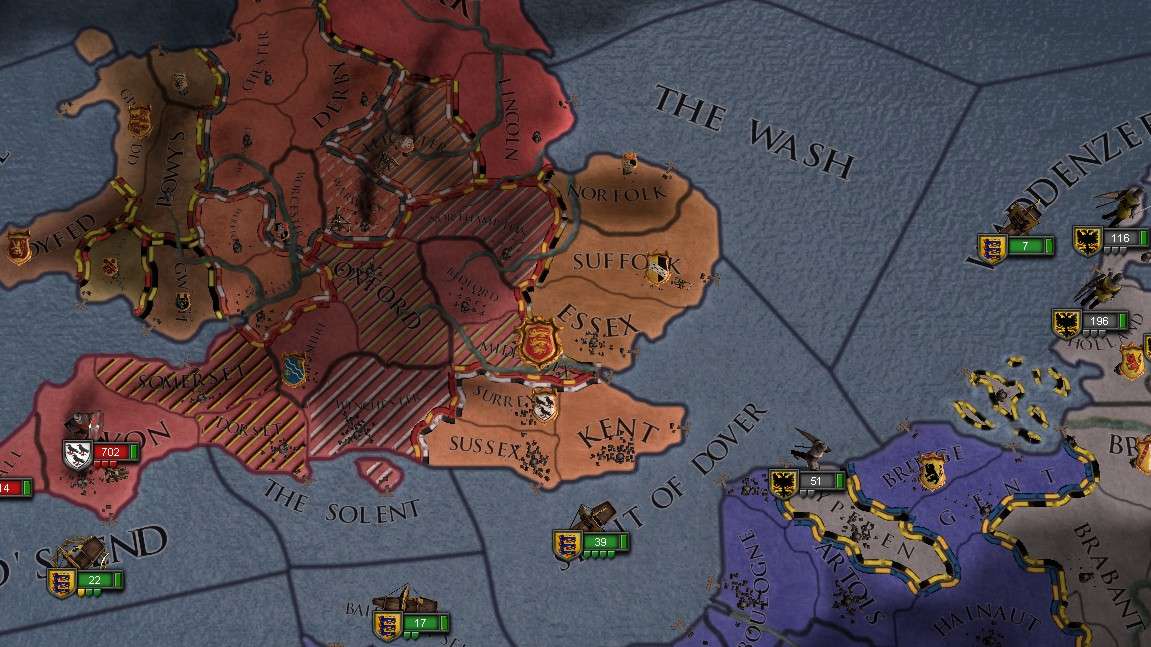

Raised the king up the Danish weapon-take and hired he the Company of the Rose, and went he then forth to conquer.
Ahem.
Right, no more Saxo. While undoubtedly a valuable historical document, it is hell on the voice. To put it bluntly, king Harald took every warrior of Denmark that he could pry loose from his vassals, hired as many mercenaries as he could afford, and went to war. England had been ravaged by warfare ever since the invasions of 1066 and currently Harold the Saxon, excommunicate and enemy of god, was fighting the four mightiest dukes of England in a war with no end in sight. Upon this war-torn land Harald descended like a vulture.
As is well known, Harald III confounded all expectations when he landed in Cornwall that summer rather than ravaging the east coast as was customary, and he proceeded to roll up Harold's forces in a lightning campaign sweeping east through Somerset and Bedford. The decisive turning point in the war was the battle of St. Pauls on August 14, 1081.
Battle of St. Pauls, August 14, 1081.
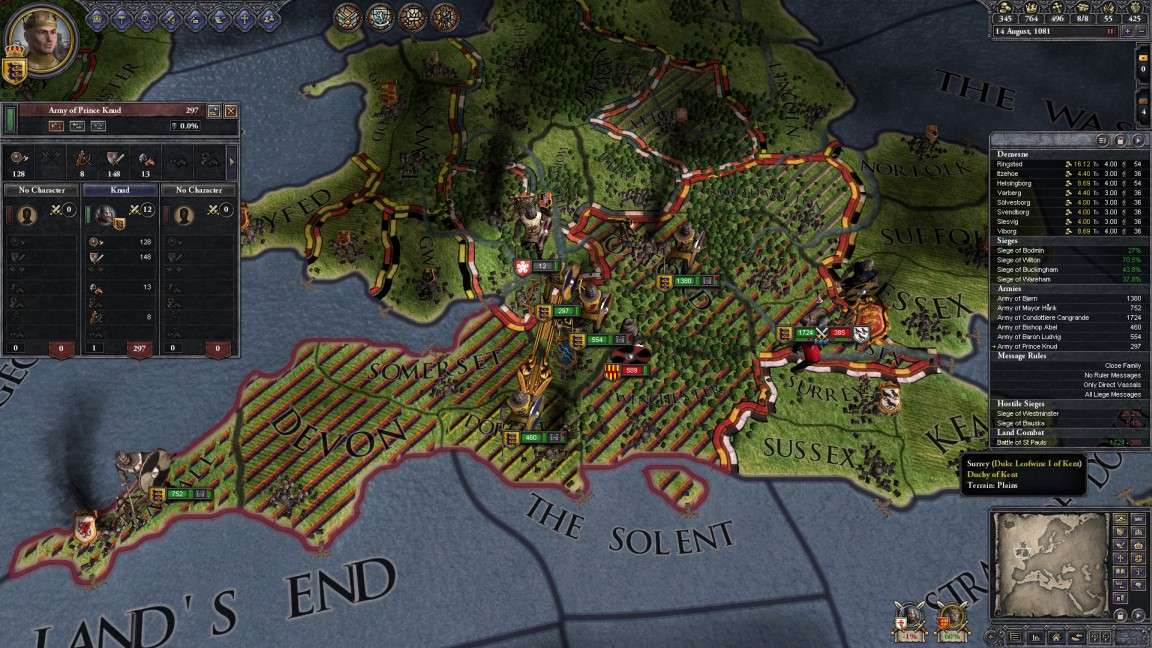

Harold's loyalists fought on for some time, but they were a spent force, Harold was imprisoned, and king Harald took the crown of England.
With Harold defeated, the dukes of Lancaster, Kent, and Norfolk and the duchess of Northumberland united in opposition to Harald and the war went into a shorter yet more bloody phase. As the united duchies gathered most of their troops in one huge army and marched south, king Harald gathered his own armies and sent out to meet them.
The Dukes Fight On!
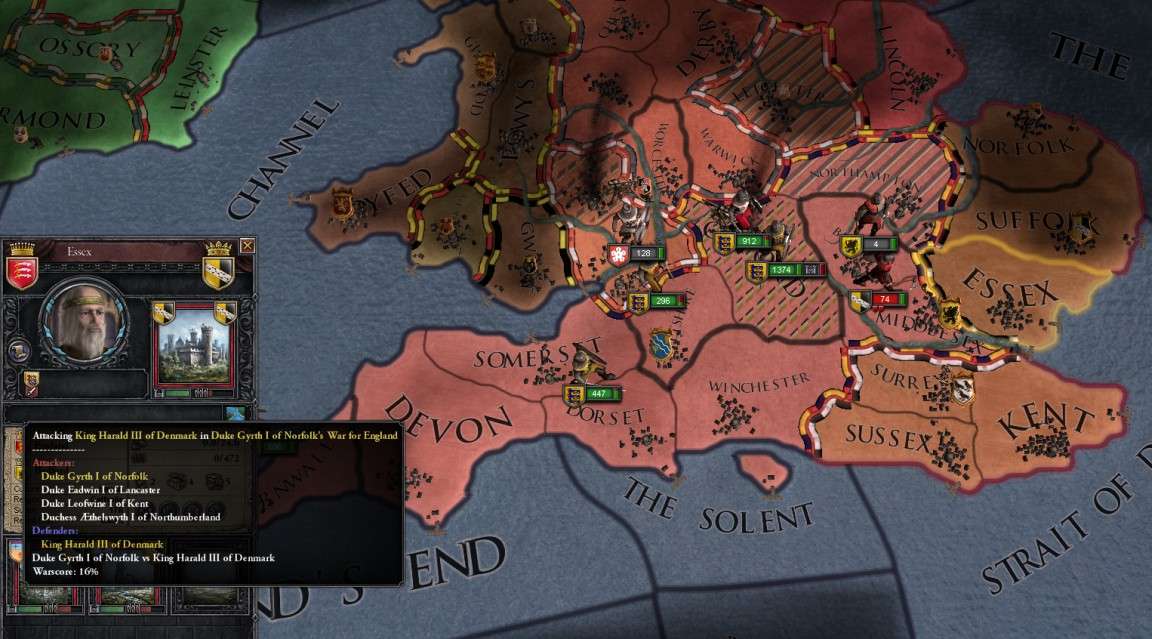

They met in Oxford and the rivers ran red. The casualties, though dwarfed in absolute terms by those of later ages, were catastrophic by the standards of the time. The dukes' army was eradicated and of Harald's army, for every three men who had stood tall and strong in the morning, only one was hale at the end of the day. As a weary Harald prepared to invade the duchies and siege the unprotected towns, the dukes gave in. They didn't surrender, but they did accept king Harald's crown.
The Dukes Give In, November 10, 1081.
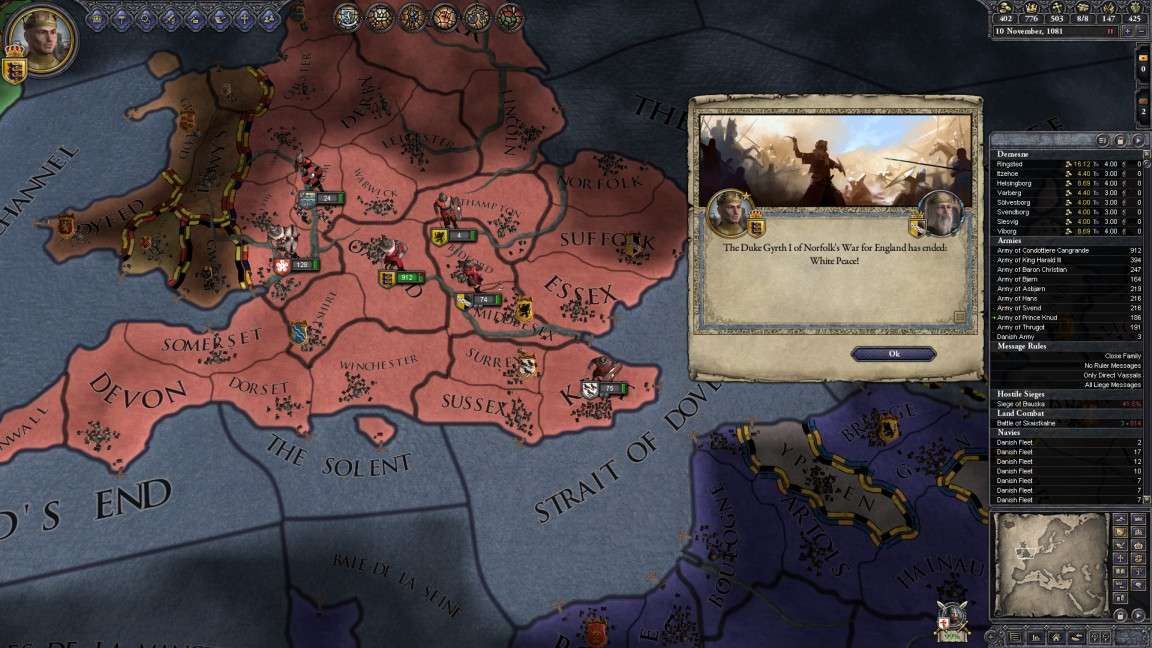
But They Are Not Happy Campers.
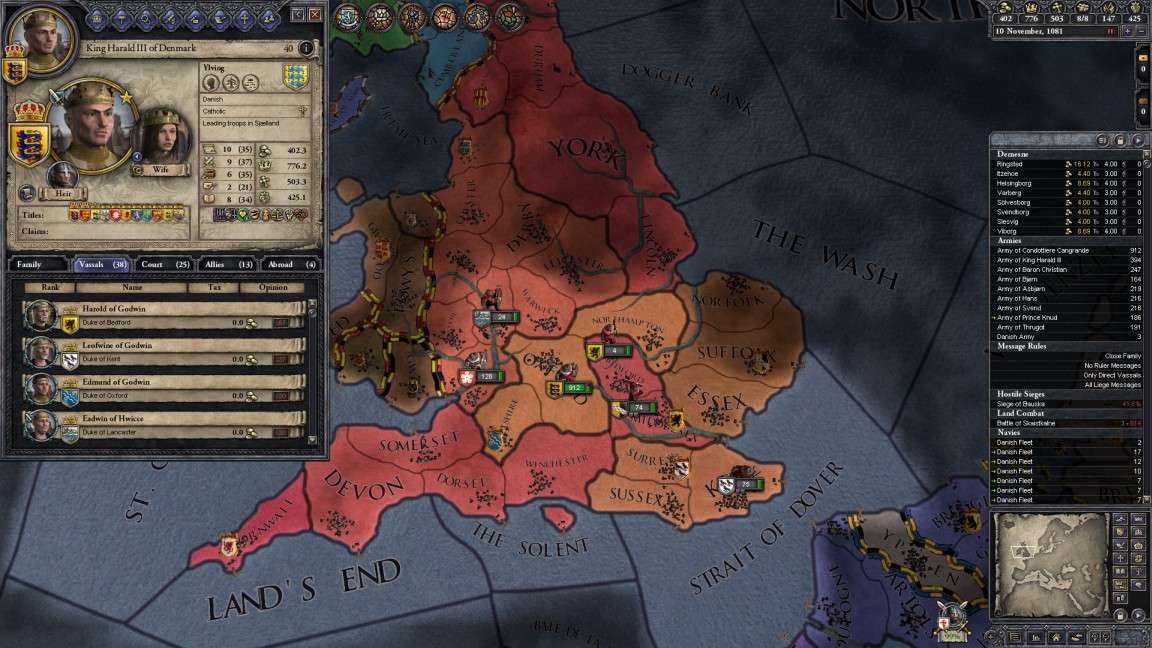
Map of Europe, November 10, 1081.
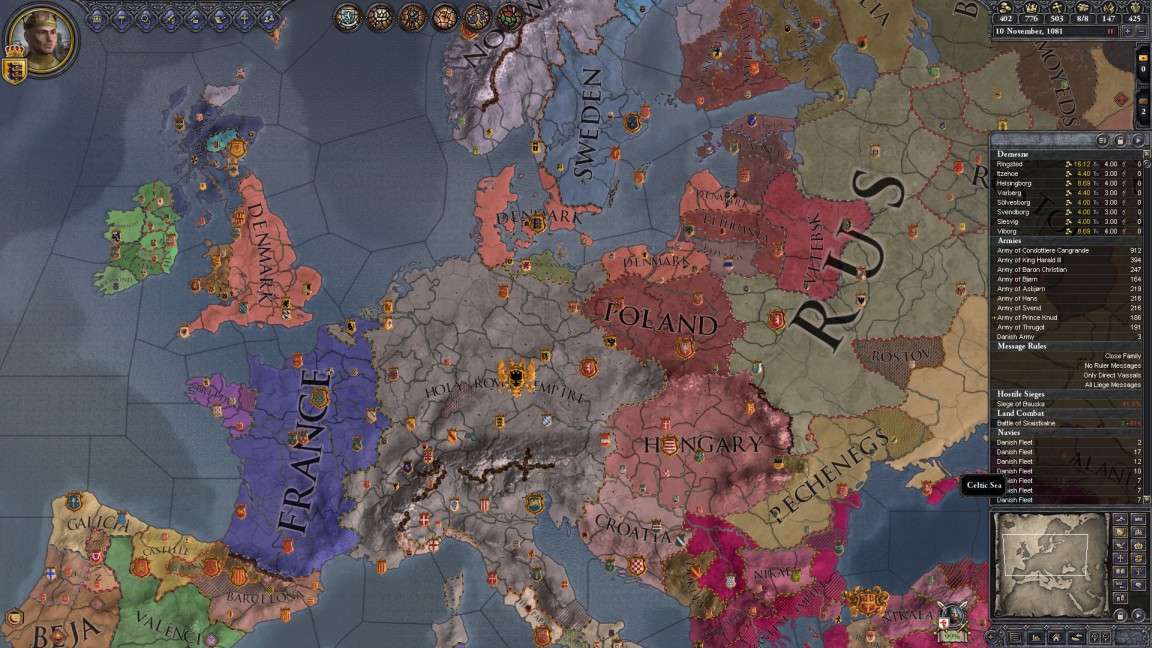
Bloody Harry

But They Are Not Happy Campers.

Map of Europe, November 10, 1081.

Bloody Harry
Victory was his, yet he had made powerful new enemies and it was only a matter of time before they acted against him, so king Harald decided to strike first. With the Danish nobility still drunk on the heady brew of victory, he passed several laws in succession strengthening the power of the monarch: First a law increasing the Danish crown's authority, enabling the king to revoke the titles of traitors and appoint the leaders of armies, second a law requiring nobles to pay a small tax. Nothing extraordinary, merely a tenth to help defray the cost of the armies needed to keep England well and truly pacified. Both laws were swiftly accepted.
Hardly had the ink dried before Harald III, king of Denmark and England, performed what latter historians have considered his most despicable act. Harold the Saxon, who had once been king Harold, a staunch Danish ally with several family members married into the Ylving family, and who was now merely an English duke who had honourably accepted Harald's terms of conquest, was let out of jail paying a considerable ransom. Hardly had he returned to his domains than Harald ordered his arrest on the grounds of being an excommunicate and enemy of god. Harold tried to rebel against this dastardly act but he stood no chance and was soon returned to jail, stripped of land.
This set the pattern for the rest of his reign. Whenever king Harald got a whiff of conspiracy or intrigue from the English, he immediately ordered the arrest of the conspirator. Anybody resisting arrest was fought, imprisoned, and stripped of the title to a county, anybody jailed, whether resisting or not, was either ransomed off immediately or left to rot.
And every single county Harald claimed by force of law he granted to an unlanded Estridson nephew, of whom there were several to choose between.
Victorious in England, on the home front Harald was sorely disappointed with his son Bjørn, his only son by the long-gone Margrethe, who showed zero evidence of higher brain functions and the sort of mushy thinking best suited for the priestly calling.
The dangers of inbreeding, 1082.
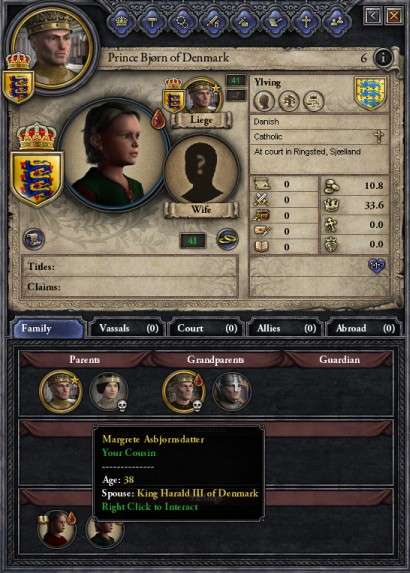

His young wife had recently granted him a second young son, but for the moment, Bjørn was it, though he might perhaps be better suited for the priesthood. At this point I should, perhaps, point out that England and Denmark as two separate kingdoms had different laws of succession. England worked by primogentiure, Denmark by an elective kingship where, in practice, the nominee was usually the oldest son, when the son was of age, but not always. With Harald III having no adult heir, his heir to the English crown was his brother Erik. To avoid splitting his newly united realm, Harald announced that until a son of his reached majority, Erik would be the heir to the Danish crown as well... thus displacing his previous choice, their younger brother Benedict.
From 1080-1083 Harald spent most of his time in one war-camp or another, putting out rebellions on the Baltic coast and stomping on ambitious vassals in England, the last vestiges of his crushing despondency gone and replaced by a wild spirit that left little room for opposition to his plans.
Yet even the greatest king cannot stand against the great leveller. In the otherwise utterly insignificant battle of Thorn, October 19, 1083, king Harald was maimed by a valiant rebel, his helmet crushed by an unfortunate blow. His death was announced five days later, and king Harald III, king of Denmark and England, was as dead as merit-based grading of students.
Exeunt king Harald III, October 24, 1083.
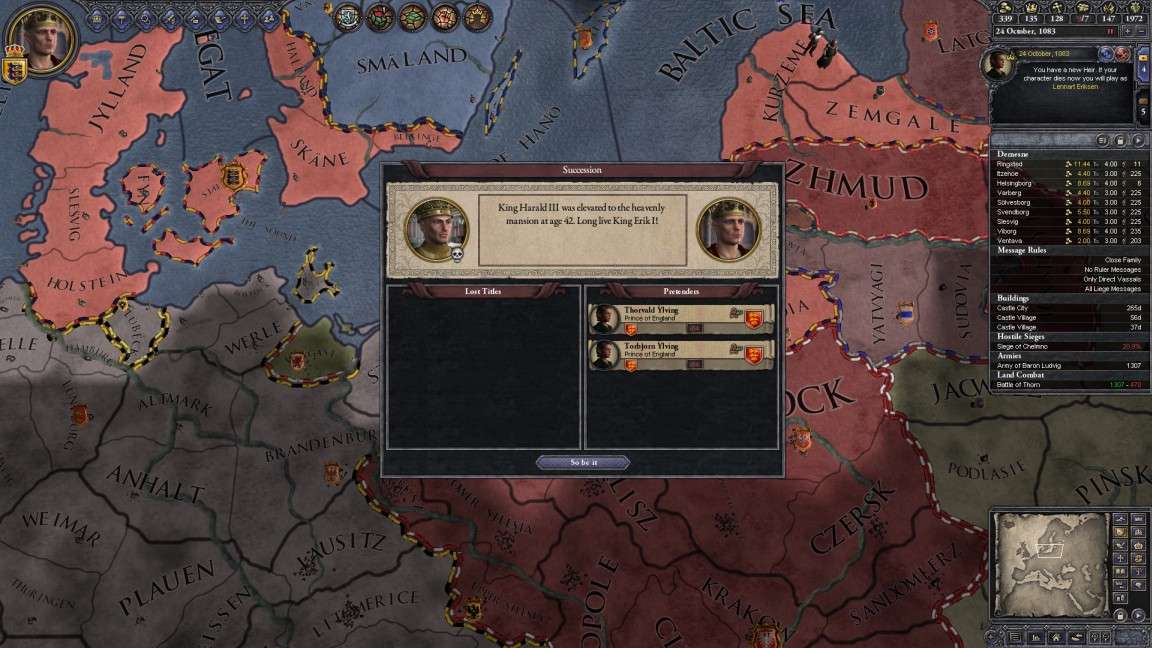

So exit Bloody Harry and welcome Erik the Merry, the third of Svend II Estridsens sons to take the throne, and a king whose long reign brought a certain much-needed measure of stability to the realm as well as fascinating advances in the field of inquisitorial procedures. Not to forget that other small thing – I'm sure even you sorry lot know what I'm referring to, yes? Any takers?
….
Well, I guess that was too much to be hoping for. You may be the flower of human civilization, my dear students, but lord knows which type of flower. A venus flytrap, perhaps.
Class dismissed.
Last edited:
- 1

